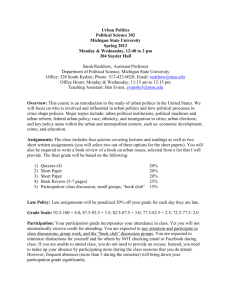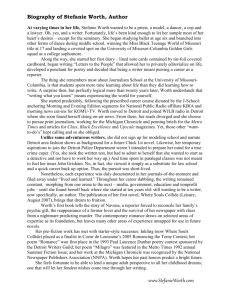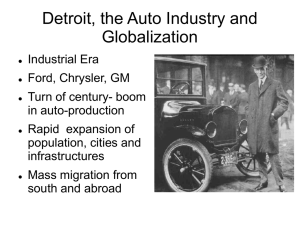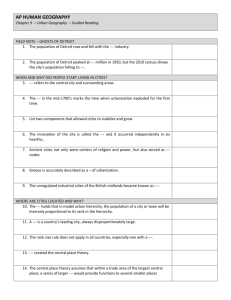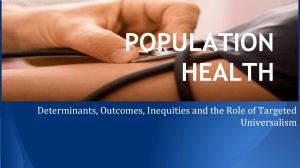PLS 302: Urban Politics
advertisement
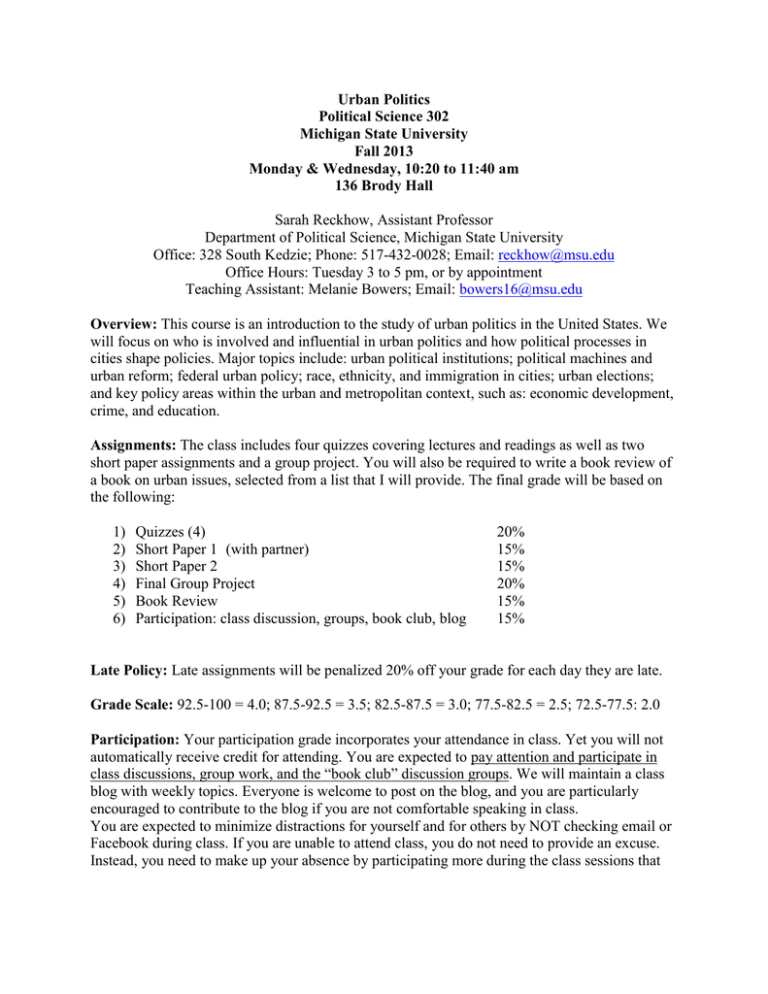
Urban Politics Political Science 302 Michigan State University Fall 2013 Monday & Wednesday, 10:20 to 11:40 am 136 Brody Hall Sarah Reckhow, Assistant Professor Department of Political Science, Michigan State University Office: 328 South Kedzie; Phone: 517-432-0028; Email: reckhow@msu.edu Office Hours: Tuesday 3 to 5 pm, or by appointment Teaching Assistant: Melanie Bowers; Email: bowers16@msu.edu Overview: This course is an introduction to the study of urban politics in the United States. We will focus on who is involved and influential in urban politics and how political processes in cities shape policies. Major topics include: urban political institutions; political machines and urban reform; federal urban policy; race, ethnicity, and immigration in cities; urban elections; and key policy areas within the urban and metropolitan context, such as: economic development, crime, and education. Assignments: The class includes four quizzes covering lectures and readings as well as two short paper assignments and a group project. You will also be required to write a book review of a book on urban issues, selected from a list that I will provide. The final grade will be based on the following: 1) 2) 3) 4) 5) 6) Quizzes (4) Short Paper 1 (with partner) Short Paper 2 Final Group Project Book Review Participation: class discussion, groups, book club, blog 20% 15% 15% 20% 15% 15% Late Policy: Late assignments will be penalized 20% off your grade for each day they are late. Grade Scale: 92.5-100 = 4.0; 87.5-92.5 = 3.5; 82.5-87.5 = 3.0; 77.5-82.5 = 2.5; 72.5-77.5: 2.0 Participation: Your participation grade incorporates your attendance in class. Yet you will not automatically receive credit for attending. You are expected to pay attention and participate in class discussions, group work, and the “book club” discussion groups. We will maintain a class blog with weekly topics. Everyone is welcome to post on the blog, and you are particularly encouraged to contribute to the blog if you are not comfortable speaking in class. You are expected to minimize distractions for yourself and for others by NOT checking email or Facebook during class. If you are unable to attend class, you do not need to provide an excuse. Instead, you need to make up your absence by participating more during the class sessions that you do attend. However, frequent absences (more than 3 during the semester) will bring down your participation grade significantly. If you miss a day when an assignment is due, you must turn in the assignment via email prior to the class period. If you will miss a quiz day, you need to make arrangements to take the quiz prior to the scheduled quiz day. Plagiarism of any kind will NOT be tolerated: “At MSU, General Student Regulation 1.00 states in part that “no student shall claim or submit the academic work of another as one’s own.” Plagiarism may be accidental or blatant and there is even self-plagiarism. However, students are held to the same standards whether or not they knew they were plagiarizing or whether or not they were plagiarizing themselves or someone else.” See: https://www.msu.edu/unit/ombud/academic-integrity/plagiarism-policy.html Course Materials: The course reader is available at Collegeville Textbooks, located at 321 East Grand River Avenue. The cost is $37.84. All of the regular class readings are included in your reader, unless otherwise specified. In addition, you will need to obtain a copy of the book that you select for the Urban Politics Book Club. Just for fun (not required): Rent and watch the HBO series, The Wire. In particular, Seasons 3 and 4 overlap with topics we will discuss in class. Guest Speakers: A few guest speakers have been invited to share their expertise with you. These are prominent local leaders, and you will have an opportunity to ask them questions. Schedule of Required Readings, Topics, and Assignments August 28: Introduction and Course Overview Urbanization September 2: Labor Day (no class) September 4: What is urban? Jane Jacobs. 1961. The Death and Life of Great American Cities. Chapters 2- “The uses of sidewalks: safety” and Chapter 3- “The uses of sidewalks: contact.” September 9: Urbanization Douglas Rae. 2005. City: Urbanism and its End. Chapter 1- “Creative Destruction and the Age of Urbanism.” Submit book club reading selections September 11: Power in Urban Politics Robert Dahl. 1961. Who Governs? Chapter 1- “The Nature of the Problem” and Chapter 10“Leaders in Urban Redevelopment.” September 16: Machine Politics; Lecture: Melanie Bowers Milton Rakove. 1975. “The Ward Organizations” September 18: Urban Reform Politics In class: meeting with Sidewalk Ethnography Groups The “Urban Crisis” September 23: The Urban Crisis Thomas Sugrue. 1998. The Origins of the Urban Crisis: Race and Inequality in Postwar Detroit. Introduction. QUIZ #1 September 25: Deindustrialization Thomas Sugrue. 1998. The Origins of the Urban Crisis: Race and Inequality in Postwar Detroit. Chapter 5- “‘The Damning Mark of False Prosperities’: The Deindustrialization of Detroit” September 30: Urban Renewal; Lecture: Melanie Bowers Anthony Flint. 2009. “The Master Builder.” Wrestling with Moses: How Jane Jacobs Took on New York’s Master Builder and Transformed the American City. October 2: Minority Political Incorporation Neil Kraus and Todd Swanstrom. 2001. “Minority Mayors and the Hollow Prize Problem.” PS: Political Science and Politics. SHORT PAPER #1 DUE City Government and Politics October 7: Mayors, Councils, and Managers Sarah Reckhow. 2013. “Respect the Depths: Campaign Rhetoric Meets Bureaucratic Reality.” in Crime and Justice in the City as Seen Through The Wire. Ed. Peter Collins and David Brody. October 9: The View from Lansing Guest Speaker: Lansing Mayor Virg Bernero October 14: Local Interest Groups and Community Organizing Ben Austen. 2013. “The Death and Life of Chicago.” The New York Times Magazine. Mark Warren. 1998. “Community Building and Political Power: A Community Organizing Approach to Democratic Renewal.” American Behavioral Scientist. October 16: Urban Elections QUIZ #2 October 21: Movie- Street Fight Gwen Ifill. 2009. The Breakthrough: Politics and Race in the Age of Obama. Chapter 7- “Cory Booker.” October 23: Discussion: Street Fight Urban Policy October 28: Urban Budgets- Taxing and Spending “Fiscal Stress Faced by Local Governments” 2010. Congressional Budget Office. BOOK REVIEW DUE October 30: The View from Michigan: Budgets in Crisis- Guest Speaker- Eric Scorsone (Michigan State University) Reading- TBA November 4: Book Club Discussions November 6: Debate—Detroit Bankruptcy and Emergency Managers November 11: Urban Education Sarah Carr. 2013. Part I and Part II. p. 9-71. Hope Against Hope: Three Schools, One City, and the Struggle to Educate America’s Children. Submit Proposals for Final Group Project November 13: Accountability and Urban Schools QUIZ #3 November 18: Urban Economic Development Richard Florida. 2003. The Rise of the Creative Class and How It’s Transforming Work, Leisure, Community, and Everyday Life. Chapter 12- “The Power of Place.” Edward Glaeser. Triumph of the City. “Why Do Cities Decline?” November 20: Economic Development in Lansing- Guest Speaker- Bob Trezise (President and CEO of LEAP) SHORT PAPER #2 DUE November 25: Crime and Public Safety James Q. Wilson and George L. Kelling, “Broken Windows,” The Atlantic. March 1982. Wrapping Up December 2: Immigration and Urban Policy; Lecture: Melanie Bowers Monica Varsanyi. “City Ordinances as ‘Immigration Policing by Proxy’.” and Jill Esbenshade et al. “The ‘Law and Order’ Foundation of Local Ordinances.” in Taking Local Control: Immigration Policy Activism in U.S. Cities and States. December 4: The Future of Cities Group work day for final project QUIZ #4 Paper Assignments For each assignment, you should write a 4 to 5 page paper (double spaced, 12 point font). Sidewalk Ethnography- Written with a partner (based on Jane Jacobs, “The uses of sidewalks”) DUE October 2 This paper assignment will be completed with a partner from class. You will turn in one coauthored paper together. Completing the assignment will involve three steps: 1. Individually, you will closely observe a city block in Lansing or your hometown (if you happen to spend a weekend at home). A mixed-use area is preferable. Use the model that Jacobs uses to observe Hudson Street, described from p. 50 to 54. Try to observe the area for at least 2 hours at 2 different times of day (i.e. morning and evening). Takes notes on the people who use the sidewalk and their interactions. Additionally, take at least 3 photos to represent the activity occurring on the block, the structures, and surrounding environment. Who are the people? Where do they appear to be going or coming from? Are they in groups or alone? Do strangers interact with each other? Also observe the buildings and transportation in the area—the mix of houses, businesses, cars, buses, bikers, and walkers. If there are businesses in the area, go inside a few and speak with the owners. How do they feel about the block? What kinds of interactions do they have with their neighbors on a daily basis? Observations must occur before class September 18. You must bring written notes from your observations and 3 photos to class on September 18. 2. Meet in a group of 4 in class on September 18 to discuss and reflect on observations and photos. Compare and contrast experiences and observations. 3. Select a partner from your group who observed a different area –write a joint paper reporting on your individual observations and comparing and contrasting the different blocks. In your paper, name the places (the street and cross streets, city name) that you and your partner each observed. Using Jacobs as a model, describe the interactions you each observed in close detail. Use specific examples from the notes you collected to illustrate your points. Be sure to compare and contrast each of the places that you observed with Jacobs’ observations of Hudson Street, focusing on the interactions between the people in each place. Conclude by reflecting on how your experience of these areas, including both the area you directly observed and the areas your fellow group members shared with you, supported or challenged your existing assumptions about cities, the types of people that live in and utilize urban spaces, and the differences across geographic areas in cities as well as any additional thoughts you had from your experience. Mayoral Election Analysis DUE November 20 Choose a recent mayoral election in a major city: - New York City, 2013 - Chicago, 2011 - Oakland, 2010 - Washington, D.C., 2010 - Detroit, 2013 - Los Angeles, 2013 - Propose your own (but check with me first) Research the candidates, issues, and outcome of the election by reading at least 10 newspaper articles. In addition, you may consult other sources, such as academic research and political blogs. In your paper, answer the following questions: - Who were the major candidates and what were their backgrounds/political experiences? - What were 2 major issues in the campaign? What were the candidates’ positions? - Explain the logistics of the election. (i.e. Was it partisan or non-partisan? Was the main contest a primary? Was there a run-off? Was there a special system of voting?) - Who won? Which groups were the main supporters for each candidate? Was voting divided by race/ethnicity? By socio-economic status? Provide citations for each of the 10 news articles you read, as well as any additional sources. The Urban Politics Book Club In addition to the required readings for the course, everyone will select one book from the following list to read during the semester. You will write a review of this book (due October 28) and participate in the book club discussion group with other members of the class who read the same book. On September 9, be prepared to submit your top 2 book choices from the list below (this will allow us to even out the number of students reading each book). Please DO NOT select a book you have read before. Most of the books are long—around 300 pages—so don’t expect to find a short book that you can read in one sitting. I would be happy to answer any questions about the books to help you make a selection that matches your interests. All of the books are available on Amazon. Thomas Sugrue. 1998. The Origins of the Urban Crisis: Race and Inequality in Postwar Detroit. Steven Erie, Vladimir Kogan, and Scott MacKenzie. 2011. Paradise Plundered: Fiscal Crisis and Governance Failures in San Diego. Joe Flood. 2010. The Fires: How a Computer Formula, Big Ideas, and the Best of Intentions Burned Down New York City—and Determined the Future of Cities. Buzz Bissinger. 1998. A Prayer for the City. Paul Tough. 2008. Whatever it Takes: Geoffrey Canada’s Quest to Change Harlem and America. Sarah Carr. 2013. Hope Against Hope: Three Schools, One City, and the Struggle to Educate America’s Children. Franklin Zimring. 2011. The City that Became Safe: New York’s Lessons for Urban Crime and Its Control. Book Review: Due October 28 You will write a 4 to 5 page (double-spaced, one inch margins) book review of your book. The book review should be written in the style of a New York Times book review, including some summary of the book’s arguments along with assessment of its strengths and weaknesses. In addition, you must address the following questions: - What lessons could urban politicians and policy-makers take away from this book? - Would you recommend this book to urban politicians and policy-makers? Why or why not? I encourage you to read several book reviews from the New York Times and other major newspapers such as the Los Angeles Times, as well as magazines. Take note of the style—book reviews are an opportunity to be creative and engaging in your writing. Final Group Project Poster Session: Tuesday December 10; 10 am to noon. This session is mandatory and replaces the final for the course. You will form a group of 3 or 4 students in the class in order to complete this project. As a group, you will submit a 1-page written proposal for the final project in class on November 11. The written proposal must describe your research topic, the sources of data/references you plan to use, your timeline for completion, and your strategy for dividing/sharing labor among the group members. Choose one of the following urban policy problems in one specific city to study. If you would like to propose a problem that is not on this list, you should talk to me about your idea. Student Achievement-- Detroit Public Schools By many measures, Detroit appears to have some of the lowest levels of student achievement of any school district nationally. The district has also lost thousands of students to surrounding suburban districts and charter schools. The state currently has taken over financial management of the district, and 15 low-performing Detroit public schools are overseen by the Educational Achievement Authority. Foreclosures and Property Abandonment—Reviving Neighborhoods; Detroit, Lansing, or Flint Michigan’s rate of foreclosures following the financial crisis was among the highest in the nation, and the highest rates of foreclosures in the state are in Michigan’s cities. The resulting property abandonment and neighborhood decline produces a serious problem for cities, not to mention the grave difficulties for households that face foreclosures. Unemployment—Economic Development; Detroit, Flint, Saginaw, or Pontiac The July 2009 unemployment rate in both Detroit and Flint was 28.9 percent. Pontiac’s unemployment hit 35.1 and Saginaw reached 23.6. Each of these cities is trying to promote new economic development strategies to create jobs. Crime—Improving Public Safety; Saginaw, Flint, or Detroit According to the FBI’s 2010 crime data, two Michigan cities top the list of the most dangerous cities in America (among cities over 100,000 residents)—Flint and Detroit. Meanwhile, Saginaw (a smaller city) has the highest rate of violent crime per capita. Financial Crisis—Detroit, Flint, or Benton Harbor Several Michigan cities are facing severe budget deficits. Detroit has declared bankruptcy. Flint and Benton Harbor are both governed by emergency managers appointed by the state. Propose your own problem Set up a meeting with me. Part 1: Defining the problem Questions to answer: How many (or what percent of) individuals or households are currently affected? How has the problem changed in the last 5 years, 10 years? (track the rate of change for the smallest increment available, i.e. monthly, annually, etc.) Is the entire city affected, or is the problem more intense in certain areas or among specific population groups? What are the costs of the problem for the city? How does the severity of the problem in this city compare to at least 2 other cities? Answer at least 3 of the questions listed above. You must provide at least one relevant graph or data table to report your findings in your paper. Report the source of the data underneath the table or graph. Your research may come from Census data or other data sources, as well as policy briefs, newspapers or magazine articles. Provide a list of references at the end of your paper. Part 2: Policy Solutions Analysis and Recommendation Questions to answer: Describe two examples of policy solutions to your problem. These could be solutions that have been tried in your city or in other cities. Has either one proven to be successful? Why or why not? Do current policies adequately address the problem or are they failing? What policy would your group recommend to address the problem? Would you continue an existing policy or try something new? Why do you think this policy will be most effective? Provide evidence to demonstrate the policy’s effectiveness. Products: - Your group will write a 5-6 page paper (double-spaced, 12 pt. font), combining Part 1 and Part 2. (50% of grade) Your group will produce a poster for our class poster session on December 10. (50% of grade)
